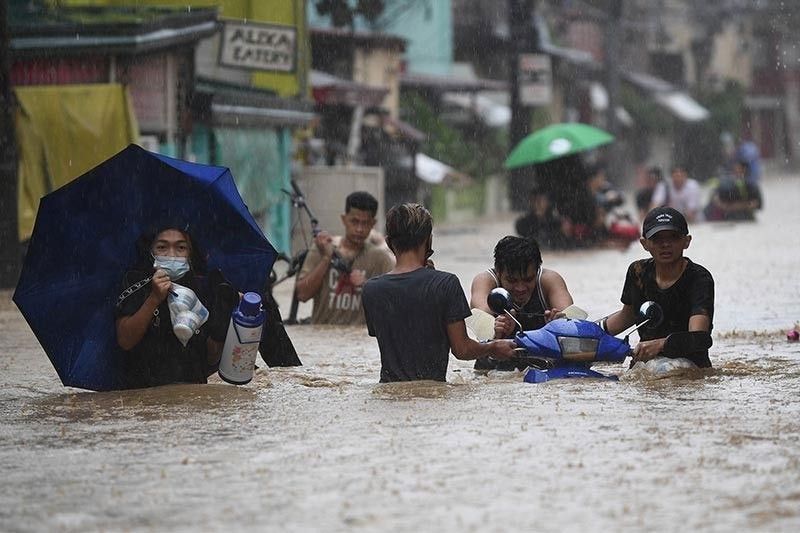OCD: Government not caught off-guard

MANILA, Philippines — The government remains on top of the situation and was not caught off-guard when Typhoon Ulysses hit the country, the Office of Civil Defense (OCD) said yesterday.
The OCD was reacting to some sectors blaming the government when flooding occurred in parts of Metro Manila and many residents were caught unprepared.
Rescue and assistance pleas came with the widespread flooding, reports said.
“There is no need for finger-pointing on who is to blame. Some members of the public did not immediately heed evacuation advice as thousands of individuals have been affected by the onslaught of Typhoon Ulysses,” Assistant Secretary Casiano Monilla, OCD deputy administrator for operations, said.
“Some individuals did not listen to evacuation warnings and stayed at home despite the typhoon. We were not caught flatfooted in that event. Local officials went around but people did not listen,” he said.
Monilla stressed that they even held several disaster risk reduction and management (DRRM) meetings before the typhoon and the information was coursed through local government units (LGUs).
He noted that the OCD and the National Disaster Risk Reduction and Management Council (NDRRMC) does not want to “micromanage on response efforts at the local level.”
“We directly connect with the different DRRM councils of regions down to the municipal and barangay,” he said.
NDRRMC executive director Ricardo Jalad said they have covered evacuation plans even before the typhoon hit with local government agencies and other national agencies.
“Knowing our current handicap in communications because of the effect of Typhoon Rolly, we used the communication systems of the Philippine National Police, Armed Forces of the Philippines and other agencies to ensure the information reached the community,” Jalad told reporters.
Monilla said there may have been limitations in forecasting, especially on the volume of rain that Ulysses would bring.
“It’s not time to point fingers, but we are focusing now on rescue operations. I’m sorry to say that. Let’s focus on search and rescue,” he said.
The OCD said there may be a need to revisit disaster guidelines and compliance of LGUs, following the devastation of Ulysses.
Government urged to build ‘typhoon-resistant’ homes
Meanwhile, a lawmaker representing Bicol region, part of the country’s so-called “typhoon belt,” is urging the government to build storm-resistant homes for Filipinos living in the country’s eastern seaboard and other flood-prone areas.
Ako Bicol party-list Rep. Zaldy Co said that since the Philippines is visited by an average of 20 tropical cyclones a year, government should seriously consider building stronger homes for the most vulnerable Filipinos.
“Instead of using public schools as evacuation centers, moving people out of harm’s way during every storm, and eventually spending public funds to help repair damaged homes, we should consider more permanent solutions,” he said.
Co proposed that government set up a five-year Core Shelter Assistance (CSA) program which, technically, is a Disaster Resilience Program. This can be done by providing shelters made of slabs with concrete hollow block walls with corresponding windows and doors. To minimize costs, he said these concrete houses will just be roughly finished.
“The structure must be designed to withstand even 380 kilometer-per-hour winds. Per my estimate, each house will cost around P120,000 to P150,000 which the national government shall provide. The land will be identified and donated by the respective local government units because they know the terrain where these shelters can be safely built,” he explained.
He said main beneficiaries of the CSA program should be the 4P beneficiaries whose homes are located near the eastern seaboard of the Philippines and those along frequently flooded riverbanks.
“The CSA program ensures that beneficiaries’ homes shall not be destroyed by strong typhoons. At the same time, it will prevent frequent government expenses to restore or repair destroyed houses of the poorest of the poor located in the typhoon belt,” the congressman stressed.
As to source of funds, Co said government is spending billions to evacuate, feed, provide temporary shelter and repair damaged homes of the poor. “It’s a neverending cycle. Government spends to provide aid, only for these evacuees to return to their high-risk abode. It’s time we change that,” he said.
- Latest
- Trending





























